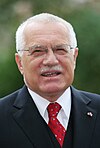You can help expand this article with text translated from the corresponding article in Czech. (July 2018) Click for important translation instructions.
|
| Jiří Gruša | |
|---|---|
 Jiří Gruša in 2011 Jiří Gruša in 2011 | |
| Born | (1938-11-10)November 10, 1938 Pardubice, Czechoslovakia (present-day Czech Republic) |
| Died | October 28, 2011(2011-10-28) (aged 72) Bad Oeynhausen, North Rhine-Westphalia, Germany |
| Occupation |
|
| Nationality | Czech |
| Notable awards | Jaroslav Seifert Prize (2002) |
| Children | Martin Gruša |
| Signature | |
| President of PEN International | |
| In office October 2003 – October 2009 | |
| Preceded by | Homero Aridjis |
| Succeeded by | John Ralston Saul |
Jiří Gruša (10 November 1938, in Pardubice – 28 October 2011, in Bad Oeynhausen) was a Czech poet, novelist, translator, diplomat and politician.
Life and career
Gruša was born in Pardubice, then Czechoslovakia (present-day Czech Republic), and later moved to Prague. He graduated from the Philosophical Faculty of Charles University in Prague. He worked for periodicals Tvář, Sešity and Nové knihy.
He started coming under the scrutiny of the communist regime of then Czechoslovakia in 1969 because of his writings. He was banned from publishing and had to work in a construction cooperative. He took part in distribution of samizdat literature. He was arrested in 1974 for "the crime of initiating disorder" after distributing nineteen copies of his first novel, Dotazník (The Questionnaire) and voicing his intention to have it published in Switzerland. After world-wide protest, he was released after two months. He later became a signatory of the human rights document, Charter 77. In 1981 his citizenship was revoked, and between 1982 and 1990 he lived in the Federal Republic of Germany.
In 1990 conditions in Czechoslovakia became more favorable and he returned to work for the Ministry of Foreign Affairs. From 1991 to 1997, he served as an ambassador to Germany. Later, he joined the minority government of Václav Klaus as a Minister of Education. The government lost support of the opposition parties and President Václav Havel orchestrated establishment of a new caretaker government. Even though Gruša was a non-party minister, he was replaced by Jan Sokol. He served as an ambassador to Austria until 2004. From 2005 to 2009 he was Director of the Diplomatic Academy of Vienna. From 2004 to 2009 he was the President of PEN International.
Gruša participated in standardisation of the term "Tschechien" as the official name of the Czech Republic in German language. See Name of the Czech Republic for overview.
Gruša died at the age of 72 on 28 October 2011 during a heart operation in Germany. Václav Havel wrote (before his own death a month and a half later on 18 December) that Gruša was "one of a few close people whom I deeply respected and who have left this world recently."
Awards and honors
- 2007: Chevalier of the Legion of Honor of France
- 2006: New Culture of New Europe Award
- 2002: Jaroslav Seifert Prize
Works
English translated
- Franz Kafka of Prague, Trans. Eric Mossbacker.
- The Questionnaire, Trans. Peter Kussi.
Czech language
- Umění stárnout
- Gebrauchsanweisung für Tschechien und Prag
- Grušas Wacht am Rhein aneb Putovní ghetto
Original in German
- Beneš als Österreicher Wieser Verlag, Klagenfurt 2012 ISBN 9783990290088
| This list is incomplete; you can help by adding missing items. (November 2011) |
References
- "Schriftsteller und Politiker Jiří Gruša gestorben". Der Standard. 28 October 2011. Retrieved 16 January 2024.
- ^ Jiří Gruša (1938-2011), Stephan Delbos, 31 October 2011, The Prague Post Book Blog
- ^ "Jiří Gruša" (in Czech). Festival spisovatelů Praha. Retrieved 1 February 2010.
- ^ "Interview with Jirí Grusa", Context N°17, Daily Archive Press
- ^ Horáková, Pavla (12 December 2003). "Jiri Grusa on his plans as PEN Club President". Czech Radio. Retrieved 1 February 2010.
- "Writer and diplomat Jiří Gruša dies aged 72". Prague Daily Monitor. 31 October 2011. Archived from the original on 13 July 2012. Retrieved 25 January 2012.
External links
- Interview with Jiří Gruša (Festival spisovatelů Praha)
- https://web.archive.org/web/20111003170500/http://www.penclub.at/grusa/ (in German and English)
- PEN International
| Non-profit organization positions | ||
|---|---|---|
| Preceded byHomero Aridjis | International President of PEN International 2003–2009 |
Succeeded byJohn Ralston Saul |
| Ministers of Education, Youth and Sport of the Czech Republic | ||
|---|---|---|
 | ||
| Second Cabinet of Prime Minister Václav Klaus (1996–1998) | ||
|---|---|---|
| Deputy Prime Minister |  | |
| Minister of Agriculture Deputy Prime minister | ||
| Minister of Foreign Affairs Deputy Prime minister | ||
| Minister of Finance | ||
| Minister of Defence | ||
| Minister of Environment | ||
| Minister of Transportation | ||
| Minister of Industry and Trade | ||
| Minister of Economic Policy and Development Minister for Regional Development | ||
| Minister of Culture | ||
| Minister of Health | ||
| Minister of Justice | ||
| Minister of Education, Youth and Sport | ||
| Minister of Interior | ||
| Minister of Labour and Social Affairs | ||
| Minister without portfolio | ||
- Czech male poets
- Education ministers of the Czech Republic
- Czech diplomats
- Members of the European Academy of Sciences and Arts
- PEN International
- Ambassadors of Czechoslovakia to Germany
- Ambassadors of the Czech Republic to Germany
- Ambassadors of the Czech Republic to Austria
- Charter 77 signatories
- Writers from Pardubice
- 1938 births
- 2011 deaths
- Knights Commander of the Order of Merit of the Federal Republic of Germany
- Czechoslovak expatriates in Germany
- 20th-century Czech poets
- Civic Democratic Party (Czech Republic) Government ministers
- Politicians from Pardubice
- Charles University alumni
- Diplomatic Academy of Vienna alumni